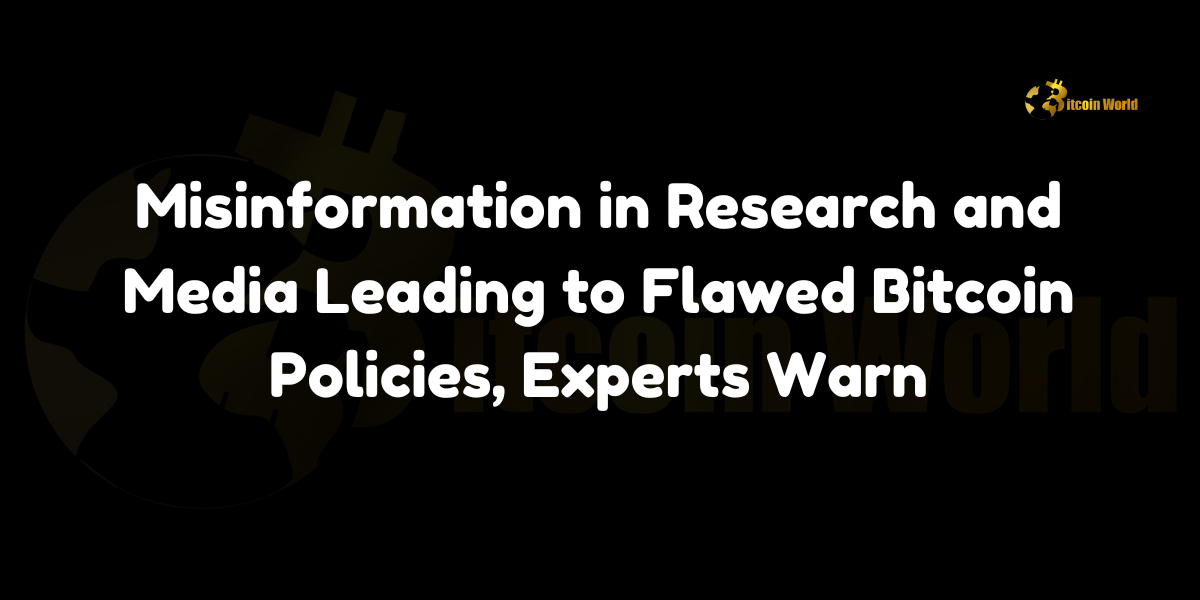Misinformation in Research and Media Leading to Flawed Bitcoin Policies, Experts Warn
In a pressing discourse at the Bitcoin Amsterdam 2024 conference, industry experts raised significant concerns about the impact of misinformation in academic research and media coverage on the formulation of Bitcoin policies. According to Cointelegraph, the speakers emphasized that flawed studies, particularly those addressing Bitcoin’s emissions and mining practices, have fueled negative public perceptions and inaccurate reporting. This misinformation, they argue, has led to the development of misguided government policies that could stifle the growth and innovation of the Bitcoin ecosystem.
The Role of Flawed Academic Research
Andrew Bailey from Yale-NUS College highlighted critical errors in influential research that has shaped public and governmental views on Bitcoin. Bailey pointed out that certain studies inaccurately assess the environmental impact of Bitcoin mining, overstating its carbon footprint without accounting for advancements in renewable energy usage and energy-efficient mining technologies. These inaccuracies not only distort the true environmental costs but also misguide policymakers in their regulatory approaches.
Media’s Contribution to Misinformation
Bradley Rettler from the University of Wyoming addressed the role of the media in perpetuating misinformation. He noted that journalists often lack the time and resources to thoroughly verify academic sources, leading to the dissemination of misleading information. This gap between complex academic findings and simplified media reports results in a skewed public understanding of Bitcoin’s technological and economic nuances, further entrenching negative stereotypes and misconceptions about the cryptocurrency.
Impact on Government Policies
Craig Warmke of the Bitcoin Policy Institute warned that these inaccuracies are not merely academic concerns but have tangible consequences on regulatory frameworks. Misguided policies, influenced by flawed research and sensational media coverage, pose harmful regulations on areas such as Bitcoin mining and financial privacy. For instance, stringent regulations on mining operations based on exaggerated emission data could hinder the adoption of more sustainable practices and innovations within the industry.
Consequences for the Bitcoin Ecosystem
The propagation of misinformation has broader implications for the Bitcoin ecosystem:
- Stifled Innovation: Overregulation based on inaccurate data can limit the development of innovative mining technologies and sustainable practices, slowing down the industry’s progress.
- Investor Confidence: Misleading information erodes trust among investors and stakeholders, potentially leading to reduced investment and participation in the Bitcoin market.
- Public Perception: Persistent negative narratives influence public opinion, making it harder for Bitcoin to gain mainstream acceptance and support.
Recommendations for Addressing Misinformation
To combat the detrimental effects of misinformation, the experts at Bitcoin Amsterdam 2024 proposed several strategies:
- Enhanced Research Standards: Academic institutions and researchers must adopt rigorous methodologies and peer-review processes to ensure the accuracy and reliability of studies related to Bitcoin.
- Media Education: Journalists should receive specialized training in cryptocurrency to better understand the complexities and avoid oversimplification of technical subjects.
- Collaborative Efforts: Industry stakeholders, including academic researchers, media professionals, and policymakers, should collaborate to promote accurate information and educate the public about Bitcoin’s true capabilities and challenges.
- Transparent Communication: Bitcoin organizations and experts should engage in transparent and proactive communication to clarify misconceptions and provide evidence-based insights into the cryptocurrency’s impact and potential.
Conclusion
The discussions at the Bitcoin Amsterdam 2024 conference underscore a critical challenge facing the Bitcoin industry: the pervasive influence of misinformation in shaping public perception and governmental policies. As Andrew Bailey, Bradley Rettler, and Craig Warmke emphasized, addressing these inaccuracies is essential for fostering a balanced and informed discourse around Bitcoin. By enhancing research standards, educating the media, and promoting collaborative efforts, the Bitcoin community can work towards mitigating the effects of misinformation and ensuring the development of effective and fair policies that support the cryptocurrency’s growth and sustainability.
To learn more about the innovative startups shaping the future of the crypto industry, explore our article on latest news, where we delve into the most promising ventures and their potential to disrupt traditional industries.
Disclaimer: The information provided is not trading advice, Bitcoinworld.co.in holds no liability for any investments made based on the information provided on this page. We strongly recommend independent research and/or consultation with a qualified professional before making any investment decisions.

